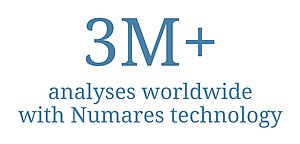Multiple sclerosis (MS) affects an estimated 2.5 million people worldwide. It is the most widespread disabling neurological condition of young adults. MS develops at any age, but most people are diagnosed between ages of 20 and 50. There is no single test for the diagnosis of multiple sclerosis. Additionally, different stages of MS cannot be determined in advance. The first step in diagnosing the disease involves a careful study of a patient’s medical history combined with a thorough physical and neurologic examination, while ruling out other possible causes of neurodegenerative symptoms.

MS is further classified into relapsing, remitting, and progressive. Eighty-five percent of MS patients will be initially diagnosed with relapsing remitting multiple sclerosis (RRMS). Of those, nearly 50% will have transition to secondary progressive multiple sclerosis (SPMS) within 10 years of the initial diagnosis. Currently, the transition to SPMS is diagnosed retrospectively based on clinical presentation and progression due to the lack of a reliable diagnostic test. The challenge for physicians has been the timely diagnosis of MS progression in order to make clinical treatment decisions aimed at retarding progression of the disease.
Metabolite Constellations. |For MS Progression Monitoring.
Advanced. Automated. Affordable.

(in dev.) In collaboration with Oxford University, Numares is evaluating a metabolite constellation to monitor relapsing remitting multiple sclerosis (RRMS) patients for the transition to the progressive form (secondary progressive MS, SPMS). The transition to SPMS can only be diagnosed retrospectively since there is no diagnostic test currently available. The serum-based test would support the monitoring of multiple sclerosis progression in clinical routine and enable early therapy intervention.
More information on the AXINON® System:
Technology. |The AXINON® System.
Easy. Fast. Efficient.

The application will be developed and provided for the AXINON® System which produces high-quality, standardized NMR spectra based on Numares’ Magnetic Group Signaling (MGS®) technology.
The combination of MGS® with the AXINON® technology platform allows for spectral analysis with highly-reproducible results. The system is easy to use requiring minimal operator interaction. The test system is fast and efficient with automation capabilities allowing short hands-on-time and high walk-away capability.
To date, more than 2 million tests have been performed worldwide using the Numares’ technology platform.